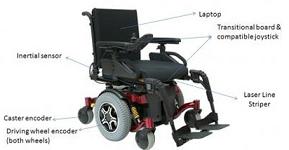Jan 20 2011
Scientists at the Florida State University College of Engineering are working on developing a technology to identify tough terrain and modify control settings of an electric-driven wheelchair. This initiative will enable protected transportation of disabled users automatically without the requirement for assistance.
 Automated Wheelchair
Automated Wheelchair
Kevin Fitzpatrick, Director of Walter Reed's Wheelchair Clinic, has stated that the technology will offer users with an improved level of self-sufficiency that may enhance their capability to partake in leisure and functional activities.
The research initiative began when Professor Emmanuel Collins, Director of Florida State University's Center for Intelligent Systems Control and Robotics, was inspired by Professor Rory Cooper’s presentation on the requirement of terrain-sensing electric-driven, wheel-chair support and the concept of using the technology formerly deployed for enabling the recovery of injured warriors.
Collins developed a system termed as laser line striper, which was actually meant for military purposes to be used in the project. As a result, a system that helps electric-driven wheelchairs to identify tough landscape and execute secure driving tactics for averting wheel sliding and wheel tilting.
The researchers have received sponsorship from the U.S. Army Medical Research and Materiel Command's Telemedicine and Advanced Technology Research Center. The research comes under the Rehabilitation Engineering and Assistive Technology sub-portfolio within the Telemedicine and Advanced Technology Research Center's Advanced Prosthetics and Human Performance research portfolio.